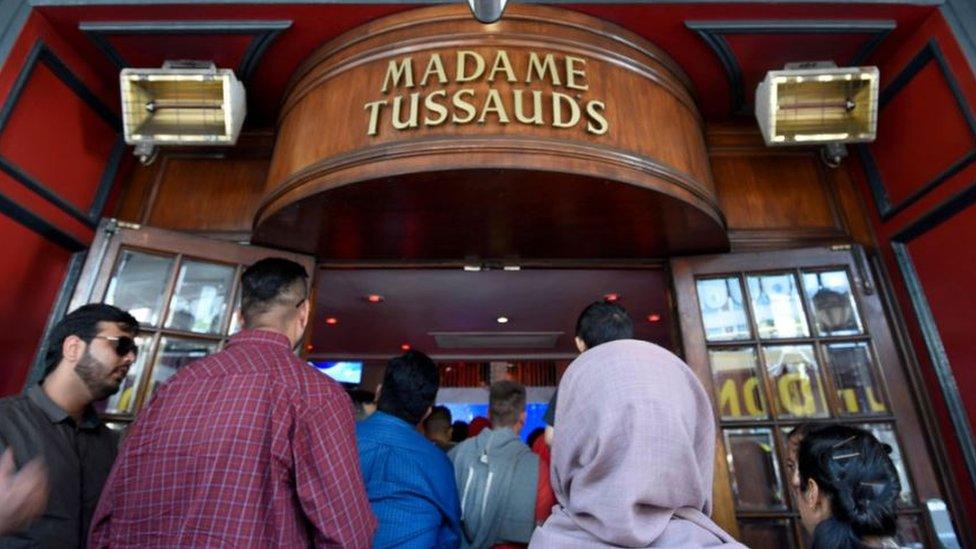The takeaway worker who plotted to attack Pride
- Published
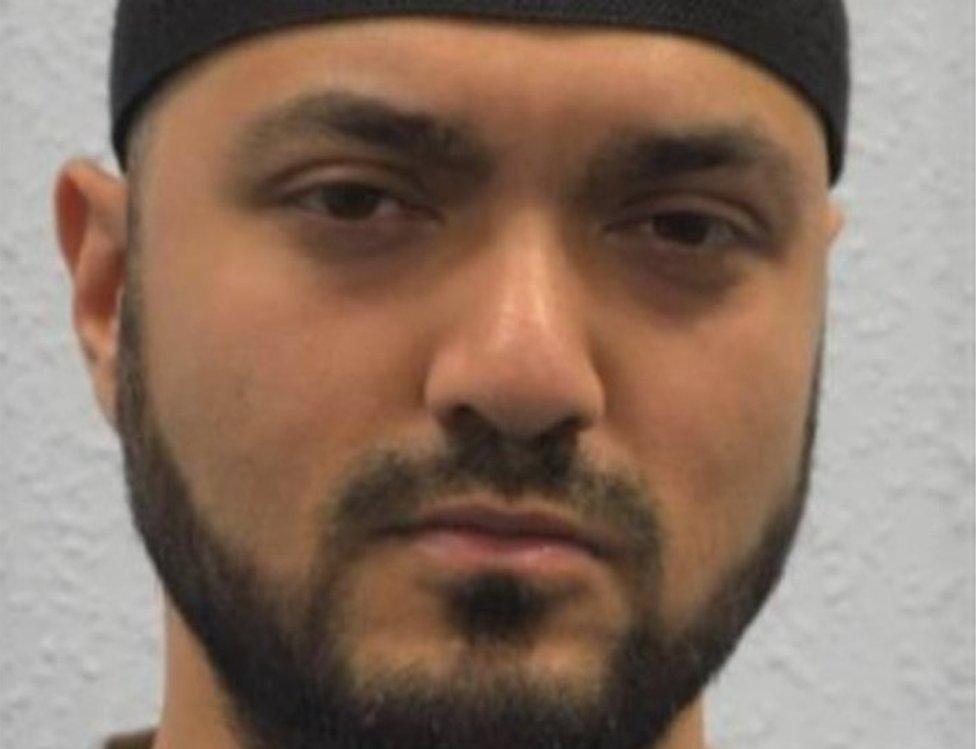
Chowdhury opened up about his terror plans to undercover officers

A chicken shop worker acquitted two years ago of a sword attack outside Buckingham Palace has been found guilty of planning a series of terror attacks, months after walking free from court. Mohiussunnath Chowdhury was convicted at Woolwich Crown Court on Monday after prosecutors revealed an undercover operation in which he had bragged to police of having hoodwinked the earlier jury. This is the story of how he was finally caught.
Chowdhury was nothing if not prepared for martyrdom.
He'd collected knives for an attack, looked into firearms training and even made a list of what he was going to do when he got to heaven.
Top of the list wasn't meeting his maker, though. It was a tour of the palace he assumed he would be given.
Second on the unmarried chicken shop worker's list was to meet and consummate his relationship with 72 wives.
Only later - seventh on the list - would he find time to meet God; and his 10th task of life in the hereafter was "choose quests to embark on".
Mohiussunnath - or Musa - Chowdhury was obsessive about quests in which he played the part of a heroic martyr doing God's work on earth.
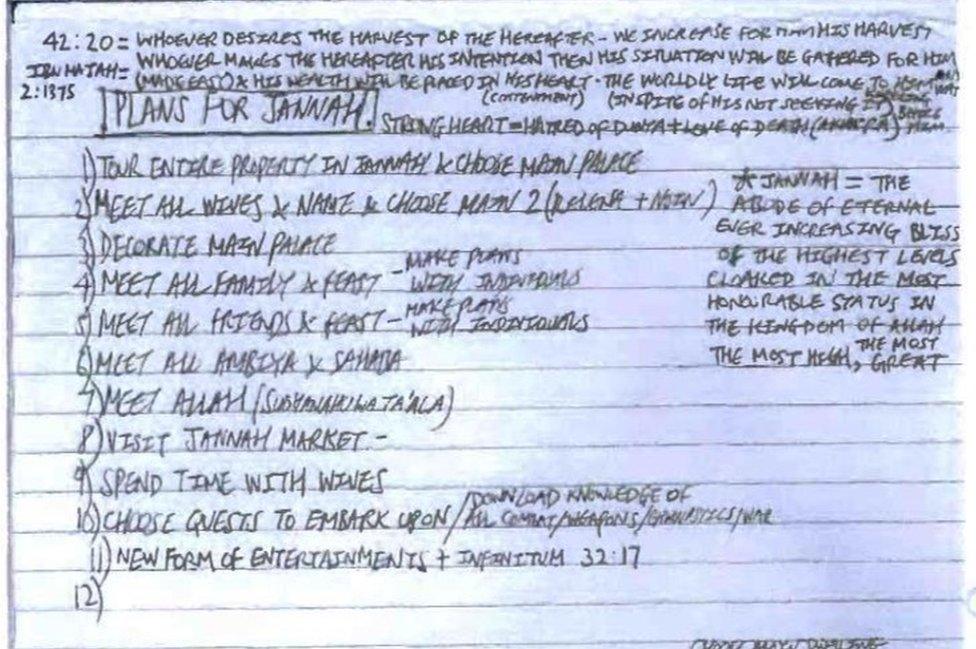
The jury was shown a note written by the defendant
The 28-year-old has now faced trial three times for terrorism plotting - and the final prosecution has led to his conviction and possible life sentence.
After almost nine hours of deliberation, a jury convicted Chowdhury, from Luton, of preparation for an act of terrorism, collecting information useful to someone preparing an act of terrorism and disseminating terrorist publications.
Prosecutors said he:
Physically trained to fight and bought swords with the help of his sister
Researched and planned to join a shooting course, obtained a replica pistol and sought a real gun
Researched targets in London
Practised wielding a knife in his bedroom for his coming attack.
His sister, Sneha Chowdhury, 25, was convicted of one count of failing to disclose information about acts of terrorism, and cleared of another.
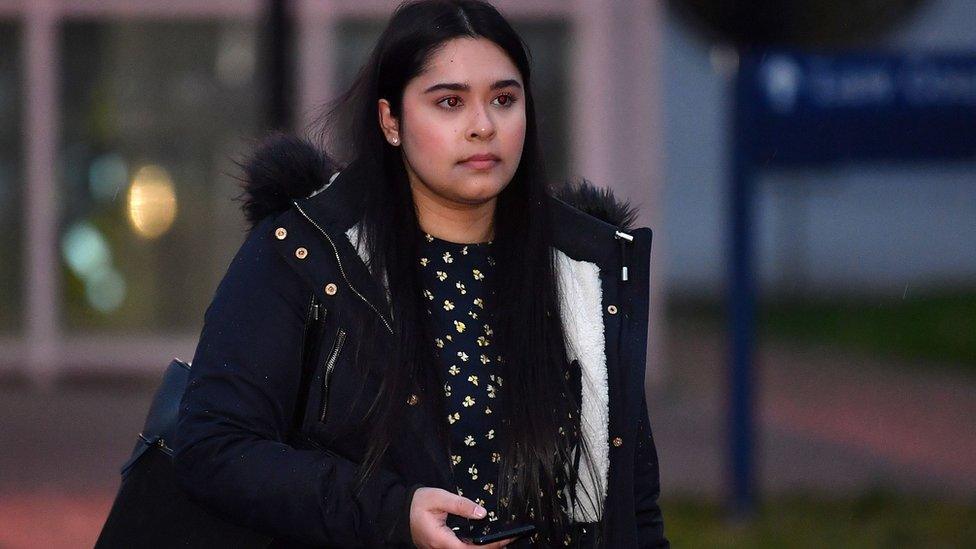
Sneha Chowdhury leaves court after the first day of the trial at Woolwich Crown Court
In August 2017, Mohiussunnath Chowdhury drove to Buckingham Palace and, carrying a samurai-style sword, got out of his car and was involved in a struggle with police officers. They suffered minor injuries - before being able to restrain him.
There were two trials in relation to that incident. The first jury failed to reach a verdict, and the second jury acquitted him of preparing an act of terrorism at a retrial in December 2018.
Mr Chowdhury told jurors he only wanted to be killed by police and did not intend to harm anyone in August 2017.
But at this third trial, jurors heard he had bragged that he had deceived that second jury - and had immediately gone back to planning an attack.
Mohiussunnath Chowdhury was involved in a struggle with police officers outside Buckingham Palace
Duncan Atkinson QC, prosecuting, told Woolwich Crown Court that Chowdhury had confided in three undercover police officers who had been put on his case within a month of his acquittal over Buckingham Palace.
He had believed the officers to be "as sincerely committed" as he was to their cause.
The targets "included Madame Tussauds in London, the Gay Pride parade and an attack on tourists on a London open-top tour bus," said Mr Atkinson.
"The object was to unleash death and suffering on non-Muslim members of the public who happened to be present, using a firearm, sword and even a van, as part of an attack.
"Whatever the position in 2017, he was unquestionably preparing for terrorism in 2019."
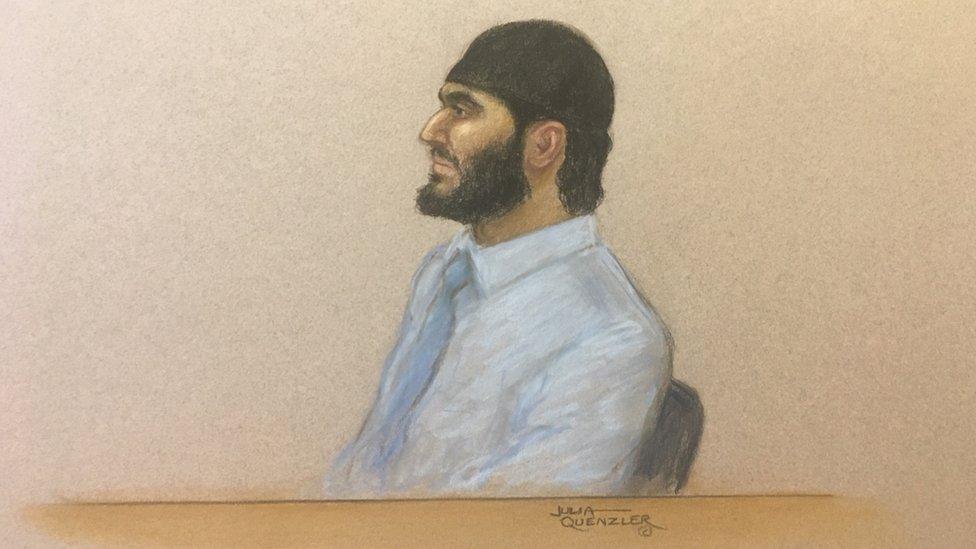
A courtroom sketch showing Chowdhury earlier on in his trial at Woolwich Crown Court
The fresh investigation into Chowdhury began when his social media posts immediately after his acquittal suggested police should still regard him as a high-risk suspect.
The posts included messages echoing jihadist propaganda, including his hopes for a battlefield death. That was enough for the police and MI5 to believe he had hit the ground running for a new attack - and the undercover team was sent in.
The officers, known only as Mikael, Hamza and Zulf, slowly worked their way into Chowdhury's life over the first six months of 2019.
The operation began when Zulf and a fourth officer posing as his uncle went to the chicken takeaway shop in Luton, where Chowdhury worked.
There, they had a conversation within the suspect's earshot that implied that the uncle was heading to Pakistan to fight and die.
The plan to spark his interest appeared to have worked. When Zulf later returned with a new undercover officer, Hamza, Chowdhury wanted to befriend them.
Mikael was then introduced into the circle and he appeared as a leader figure - sharing his aspirations for a violent attack and telling one of the others to provide the suspect with a mobile phone.
Tearful and emotional
Under the rules for undercover deployments, police officers are allowed to pose as terrorists - but not to incite the suspect to carry out an attack. Their job is to use their cover to gather evidence of what the targeted individual intends to do.
And slowly over the weeks that followed, Chowdhury opened up.
He revealed himself to be the man acquitted of the Buckingham Palace incident and told the officers he had felt "peace" before the botched attack.
He said he had wanted to kill a Buckingham Palace soldier - and smiled when he told Mikael that he believed Allah had intervened to ensure he walked out of court free.
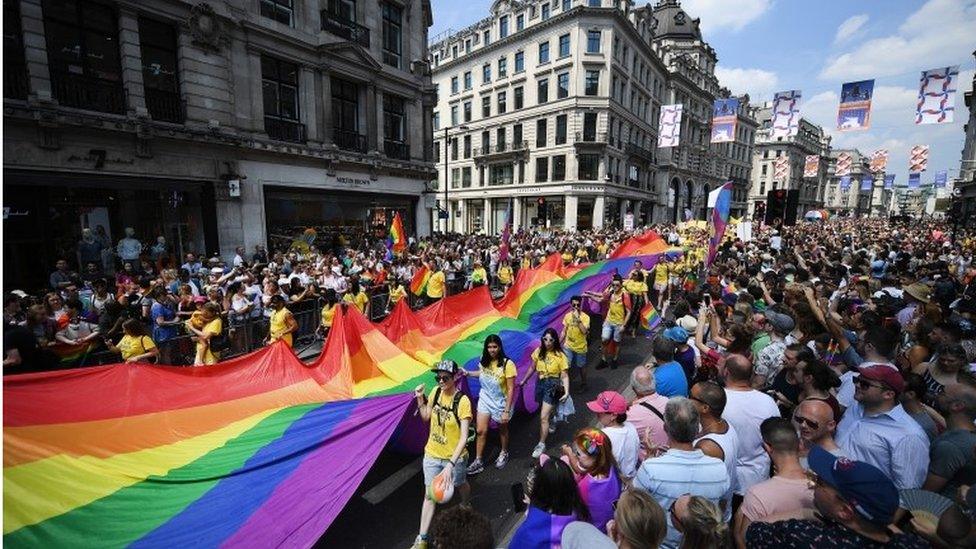
The London Pride parade was among the potential targets, the court heard
The officer Zulf said Chowdhury could recite passages of the Koran that concerned violence "from the top of his head" - a classic sign that an individual had steeped themselves in jihadist ideology.
During one meeting, Chowdhury played part of the video that was live-streamed on Facebook by the far-right killer who attacked a mosque in New Zealand.
That attack, which led to 52 deaths, had been a "win-win", Chowdhury remarked: "It only makes us more angry… we should be angry".
Speaking in court from behind a screen, Mikael said Chowdhury had shown interest in carrying out an act of terror on "many, many occasions" but never explicitly set out what his plan was.
He had also repeatedly encouraged the officer to go ahead with his own plans, becoming tearful or emotional when they discussed attacks.
At one point the university drop-out became animated at the idea of attacking Gay Pride in London. The parade would be a good target, said Chowdhury, because of its "piss-poor security… the way they march they are asking to get hit by some jihadist".
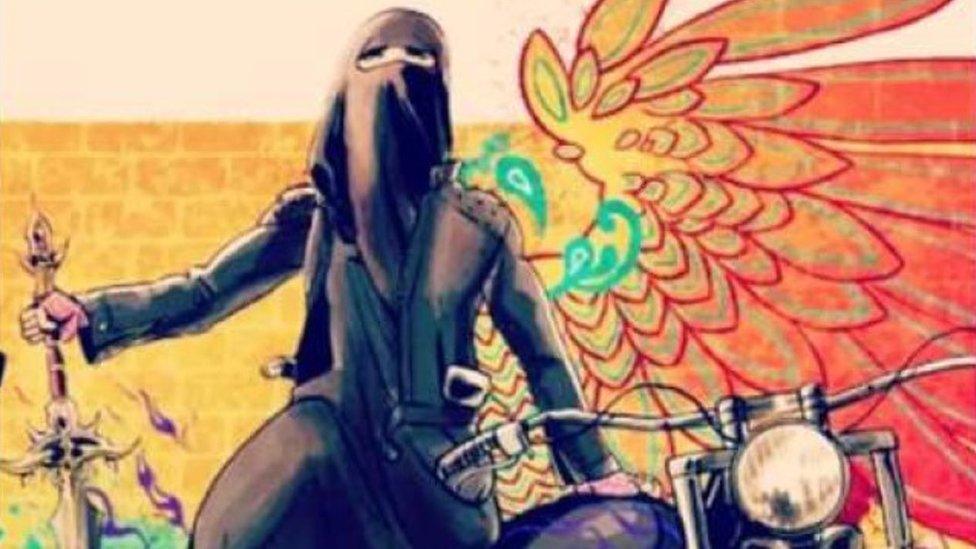
He posted a cartoon on Instagram with a comment "my wife"
After months of building a relationship, officer Mikael told Chowdhury he had obtained a gun for his own plans - and the suspect immediately asked if he could get one too.
"He told [the officers] of his training regime, and sought to involve them in firearms-related training," said prosecutor Duncan Atkinson.
"He told them of what he was wanting and planning to do, and sought to involve them in the carrying out of one or more terrorist attacks."
'I'm doing an attack'
On 17 June last year, Chowdhury allegedly posted a cartoon of a battle scene. The caption read: "I have no time to ponder questions. Now is the time to strike and kill."
Three days later, Mikael met the suspect again to confirm he had got him a gun - and to ask whether he genuinely wanted it.
Chowdhury did not answer the question directly - but shook his head. He then said he was waiting for another man from prison to join him.
Unbeknown to him, Chowdhury's home had been bugged and the recordings revealed that he had been showing his sister, Sneha, how to use a knife as a weapon.
A knife and wooden training swords - bought via his sister's bank account - were later found in the home and there were cut marks on Chowdhury's canvas-covered wardrobe.
On the same day he met Mikael to consider taking a gun, Chowdhury was recorded at home telling his sister: "I'm doing another attack, bruv."
She replied that he was "having a a down day", but he retorted: "No I'm serious, bro - it's about time now."
It was this conversation that led to Sneha being found guilty of failing to disclose information about terrorist acts.
Both Mohiussunnath Chowdhury and Sneha Chowdhury were arrested in July 2019 - days before London's Gay Pride.
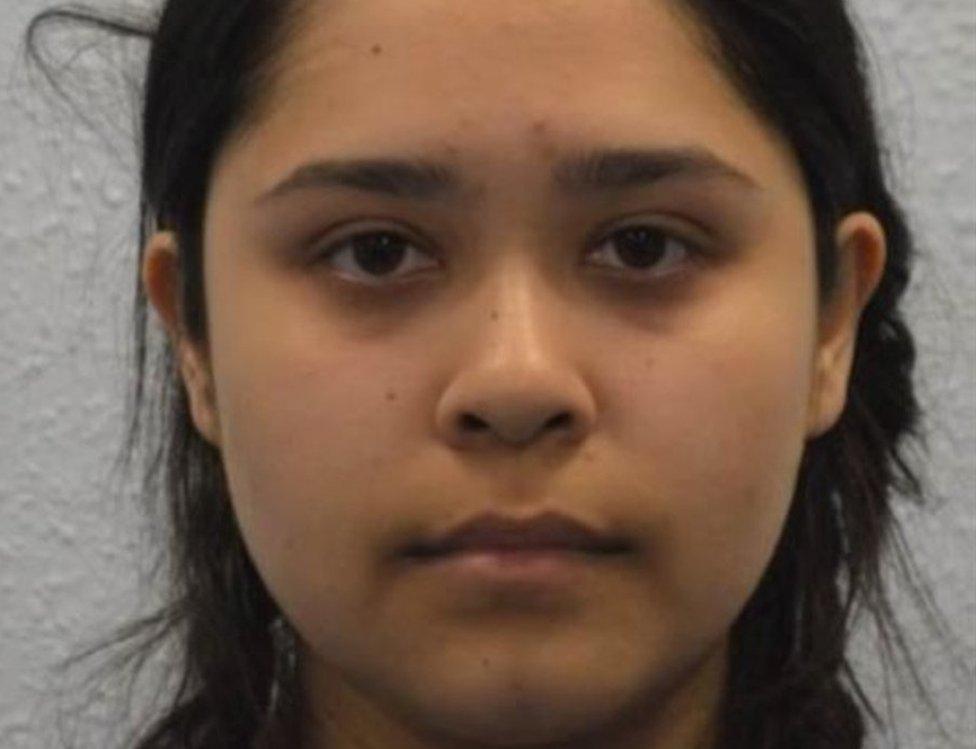
Sneha Chowdhury was accused of doing nothing to stop her brother's plans
During his defence, Chowdhury told the trial that some of his extremism, including support of the Charlie Hebdo attack in Paris - was just "jihadi banter".
He said he had become used to this kind of talk while in prison during his earlier trials, before adding it was "hard to have sympathy" for anyone who insulted his prophet.
Recordings of him discussing violent attacks with his sister, including decapitation, were simply part of his interest in martial arts and video games, he insisted.
And his own barrister told the trial that his client was an attention-seeking "pathetic little man".
Simon Csoka QC said: "What you really have with Mr Chowdhury is someone who, when you strip away that talk… who talks and talks and talks, but doesn't do.
"Would a terrorist [after being acquitted at one trial] start publishing things for the whole world to see? These posts… are all consistent with someone who is childish and attention-seeking."
But Commander Richard Smith, head of counter-terrorism at the Metropolitan Police, said: "Mohiussunnath Chowdhury is an exceptionally dangerous individual - the evidence in this trial demonstrated his intention to murder as many people as he could - and potentially to die in that attempt.
"We felt that Chowdhury posed a significant threat - but we needed to determine whether his mindset was such that he would really carry out an attack. This was not empty talk."
- Published8 January 2020
